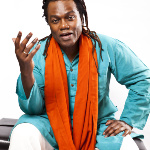- country:Angola
- style(s):Afro, Cuban
- label:Cumbancha / Putumayo
- type:Band
- instrumentation:salsa and latin band
- artist posted by:Tsahara Productions
Line up
- Ahmed Barry (Bass)
- Komba Bellow Mafwala (Drums)
- Mofongo Giraldo (Trumpet)
- Ricardo Lemvo (Vocals)
- Serge Kasimoff (Piano)
- Taty Vangu Tungila "Fofo" (Guitar)
- tbc (Congas)
- tbc (Trumpet)
Links
May 29, 2014 —
La Rumba SoYo, the new album from Ricardo Lemvo & Makina Loca, is a multinational undertaking that was recorded on three continents and in four countries (US, Canada, France and Angola). It took Lemvo three years to complete and sees him diving even deeper into his Angolan roots for inspiration. Cumbancha will release the album in North America on June 24, 2014 and September 2014 in Europe and the rest of the world!
Raised in The Democratic Republic of the Congo (known as Zaire at the time) with Angolan family roots, Ricardo Lemvo came to the US in the 1980s to pursue a law degree and ended up devoting his life to music. He has recorded numerous international hit songs, which have earned him fame not only in North America and Europe but also in Angola, Colombia, Senegal and many other countries. "I'm always hearing Ricardo's songs in unexpected places," notes Edgar, who travels widely researching music trends, "I've heard Mambo Yo Yo blasting from speakers in Barcelona, Cartagena, Paris, Dakar, Istanbul…I even heard it at a club in Tokyo not long ago. Ricardo is one of those rare artists whose music has universal appeal."
With his band Makina Loca, the Los Angeles-based singer produces an appealing blend of African and Cuban music that has earned him a worldwide following. Lemvo's early recordings drew mainly from Congolese rumba and soukous mixed with Cuban son and salsa. His 1998 hit "Mambo Yo Yo," which appeared on the first of two albums he released on Putumayo, can be heard to this day pouring out of taxicabs and on salsa club dance floors in Cartagena, New York, Tokyo, Paris and beyond.
Lemvo hails from M’Banza-Kongo, Zaire in Northern Angola. He grew up in Congo-Kinshasa where he was introduced to Cuban music by a cousin who owned a large collection of vintage Cuban LPs. Lemvo came to the US more than 30 years ago to pursue a law degree but ended up devoting his life to music. Since forming his band Makina Loca in 1990, Lemvo has toured extensively in Europe, Australia, Latin America, and Africa and released six previous albums.
While Ricardo Lemvo & Makina Loca made their name with a blend of Cuban and Congolese music, Lemvo eventually decided to explore the Angolan styles and languages he also heard while growing up in the Congo. He began singing in Portuguese and indigenous Angolan languages, and adding Angolan rhythms such as semba and kizomba to his mix. With a number of successful albums to his name, and having performed on some of the world's greatest stages, his musical career took an unexpected turn about a decade ago when he suddenly became a household name in Angola. What began as a personal artistic journey led him to be embraced by the Angolan public and his life in music began a surprising new chapter.
Today Angola has become one of the world's fastest-growing economies. Music is an essential part of the country's cultural life. Interestingly, Angola’s recording industry still has thriving record stores and is one of the few African countries where legal CDs are still prevalent in spite of the rampant piracy. Local musicians have developed a unique sales strategy to beat piracy; every weekend, musicians en masse bring their CDs to a series of outdoor markets, where they perform to backing tracks nonstop from morning until evening. Some artists can sell up to 2,000 CDs a day to the throngs of music fans that show up to the many such markets. Lemvo's music is now in high demand in Angola, and he is invited there to perform numerous times a year.
Three songs from the new album, “Dikulusu,” “Padre George,” and “Simone CM,” were written in collaboration with Angolan songwriters. With his increasing fame, Lemvo has built strong relationships with revered Angolan musicians and composers. Songwriter Adão Filipe is the director of the National Radio of Angola. A fan of Filipe's work, Lemvo asked him for some lyrics and the result was “Dikulusu” (A Heavy Cross). Fellow Angolan Ndulo Kituxi, who is well known in local music circles, composed the music. It is a humorous song in three languages (Portuguese, Kikongo and Kimbundu) about a man who complains to his ex-wife about the alimony he pays her ending up in her new husband's pocket, “Dikulusu” begins with an accordion-led Angolan semba rhythm then shifts effortlessly into a Congolese rumba.
Lemvo co-wrote “Padre George” (Father George) with the renowned Angolan artist Kyaku Kyadaff. The laid-back rumba, which features the nimble guitar work of Huit Kilos Nseka from the Congo, tells of a man who seeks the advice of a priest to help him turn his life around. “Tell me, tell me, Padre George, what sin have I committed? Please tell me, what shall I do to get out of this mess?" The third Angolan-influenced track is “Simone CM,” which was written with Caló Pascoal as a tribute to the daughter of one of Lemvo's Angolan friends. In this kizomba, a popular Angolan rhythm similar to Caribbean zouk, Lemvo sings “Oh, beautiful Simone. Lock me out of the house. Make me sleep on the sofa. I will still love you.”






